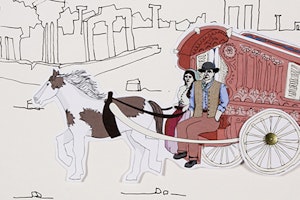France Moves to Stop Treating Its Traveller Citizens Like Foreigners
By Nara Ritz
My name is Nara Ritz. I am a nomad, a Traveller*, or in French, a voyageur français. I am on the road a few months out of the year. French authorities put me in the administrative category gens du voyage, which is distinct from Roma. We are more than 350,000 French citizens with a common culture of mobility—and a shared experience of discrimination.
We are set apart from the rest of French society in various ways, but the most striking one is certainly the livret de circulation (booklet of circulation), an internal passport that we carry everywhere, and that we have to present at the local police office on a regular basis—every three months to every three years.
Two weeks ago, the lower house of France’s parliament voted in favor of canceling internal passports. The bill will now be passed to the Senate. Although abolishing the booklet of circulation would end a long-standing human rights infringement, politicians from different parties find the bill controversial, pointing to our “behavior” and the “problems” we create.
Simply because we have a different lifestyle, they say, we should be submitted to more stringent controls. It’s a stance that disregards the shame, the exclusion, and the daily administrative constraints that the internal passport adds to every Traveller’s life.
I know about these hardships firsthand. When I turned 16, I had to go to the prefecture to complete the paperwork that would grant me my booklet of circulation. On the way there, the implications of what was about to happen swirled through my head. I will be given a document that will make me different from every other citizen. I will have to carry this special ID my whole life, years of sitting in waiting rooms with my fate in the hands of a bureaucracy.
Once at the prefecture, I went to the ID office to ask for the forms. They told me I was at the wrong department. “Where should I go?” I asked. “To the Foreigners Registration Office,” they answered. There, in the waiting room, I was the only French person amid a crowd of foreigners. I had no words. Looking at the floor, my thoughts became very confused.
At school, they teach you about “Liberté, Egalité, Fraternité.” After this day at the prefecture, these words suddenly lost their meaning as positive values and became a curse.
Liberty: From now on, I will need to go to the police office regularly to have an officer check my internal passport, like a former convict. Except I have committed no crime. This is the price of liberty.
Equality: Because of my different lifestyle, I will always have to carry an internal passport to travel in my own country. Like a yellow star or a brown triangle, the badge used by the Nazi regime to identify Roma and Sinti prisoners in concentration camps, it’s a symbol that makes me an outcast and deprives me of my basic rights.
Fraternity: In France, the mayor of a city or town has the right to limit the number of Travellers to no more than three percent of the population. Those are the ethnic quotas of fraternity.
Internal passports are a French exception—our country is the only one in the world to force its Traveller community to carry special IDs. Besides creating feelings of shame and anger, carrying an internal passport makes the performance of everyday duties complicated—opening a bank account or getting car insurance become extremely difficult maneuvers.
I am happy that there is a debate about abolishing internal passports for Travellers. I believe the bill has a good chance of passing, but let us look at the real issue: in France, the Traveller community endures daily racism, the same racism that led to the deportation of Tsiganes (the term that was used in the past by the authorities to refer to Roma and Sinti) during the Second World War. My own grandparents were sent to concentration camps in France and Germany by the French administration during that period.
As of today, there has been no official recognition of the role of the French state in the deportation of Sinti and Roma.
Two years ago, a French MP and mayor of a town in the western part of the country claimed that Hitler “did not kill enough” Roma. More recently, a Traveller settlement was burned down [French site] in a town close to Paris, with virtually no public reaction.
France needs to recognize what it did to its Traveller and Roma population during the Second World War and fully address and combat the racism and discrimination that affect us today. If it fails to do so, we will always live in fear that the worst could happen again.
*Note: In this post, the term “Traveller” is used as a translation for voyageur français, and should not be confused with Irish Travellers, who are a separate group.
The European Center of Education to Diversity is a grantee of the Open Society Foundations.
Nara Ritz is the director of the European Center of Education to Diversity.


